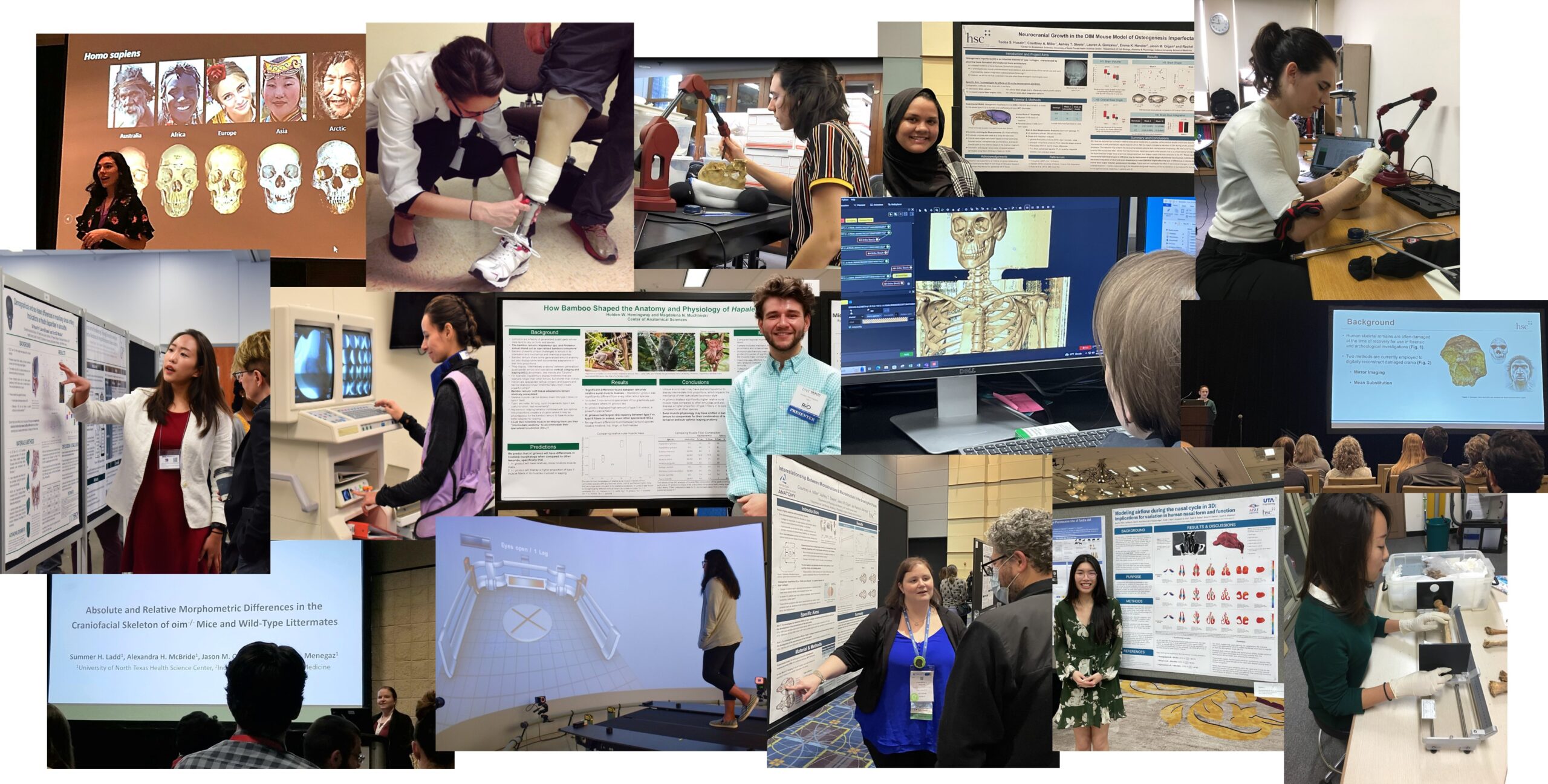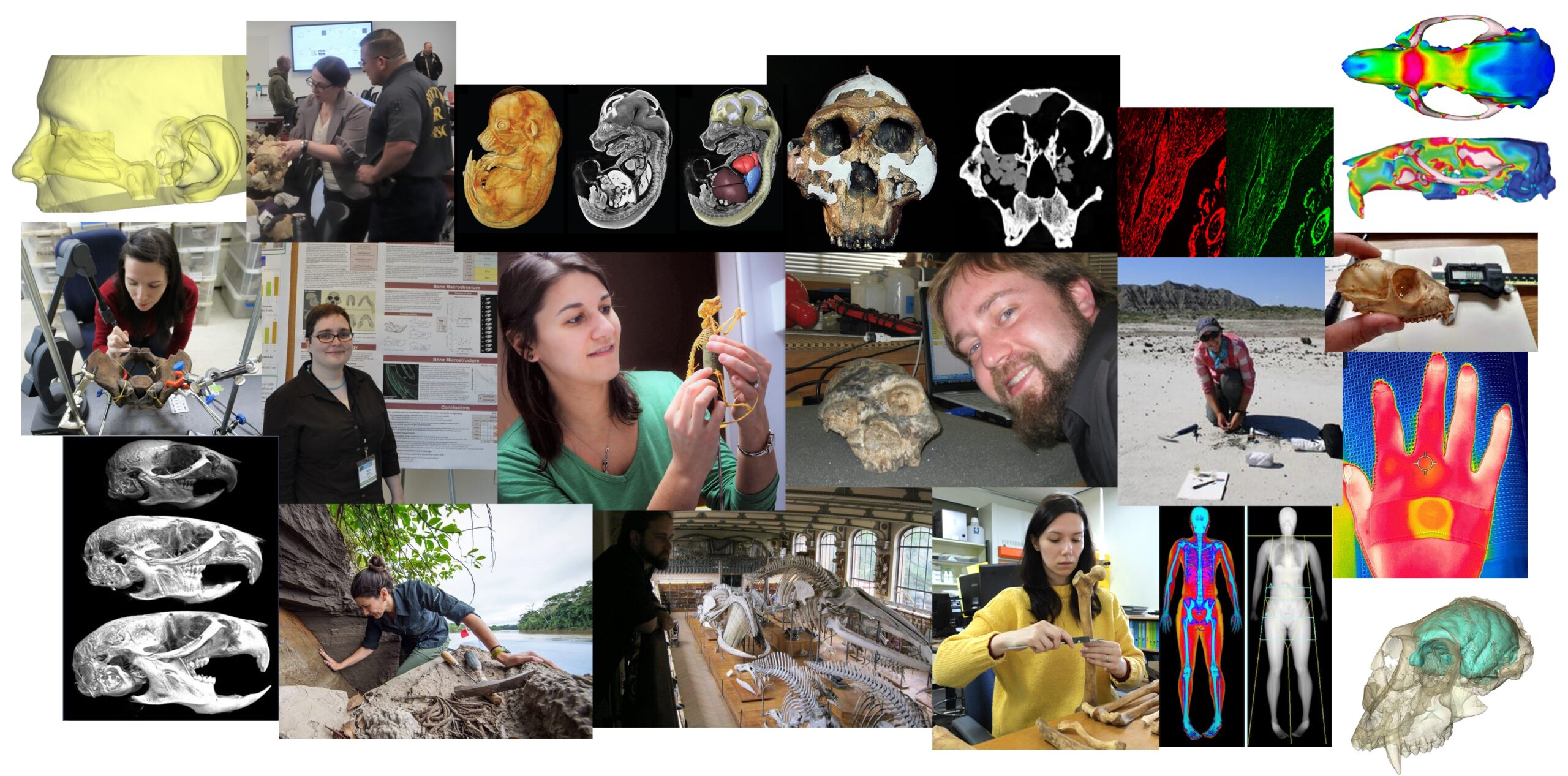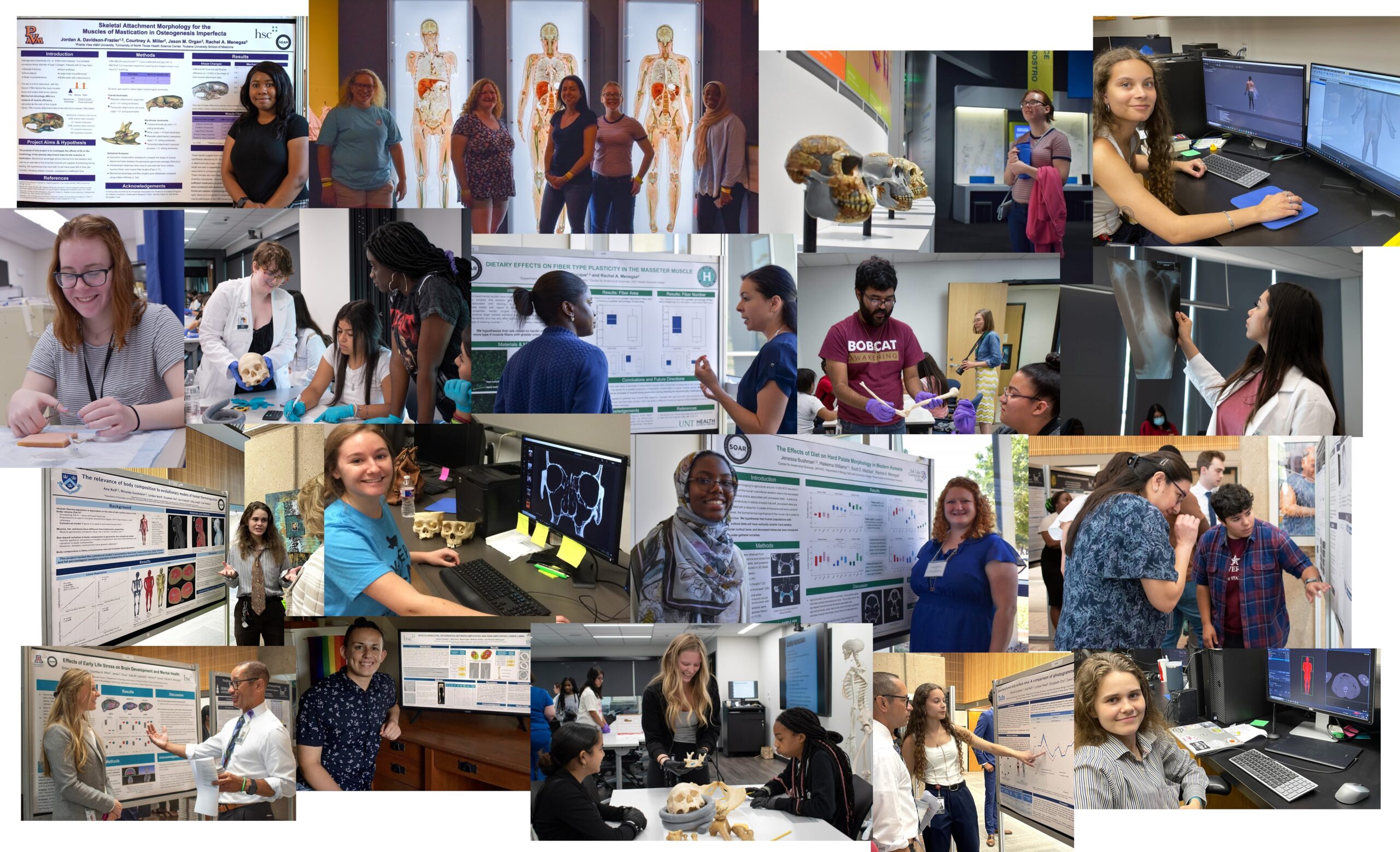Research
Research Foci
Principal research concentrations within the Center for Anatomical Sciences include:
-
Evolutionary Anatomy & Functional Morphology: Studies investigating the structure and function of musculoskeletal tissues from anthropological and/or evolutionary perspectives. Principal investigators: Cho, Lesciotto, Gonzales, Maddux, Menegaz, Perchalski.
-
Clinical Anatomy & Biomechanics: Studies investigating anatomy and biomechanics as related to orthopedics, physical medicine and rehabilitation, surgery, and other medical fields. Principal investigators: Crowe, Reeves, Lovely, Rosales.
-
Forensic Science: Studies investigating the development and application of scientific methods in medico-legal contexts. Principal investigators: Cho, Crowe, Lesciotto, Maddux
-
Education Science: Studies investigating the teaching and learning of anatomy/movement science through the development of novel educational tools, techniques, and assessment strategies. Principal investigators: Reeves, Lovely, Rosales.
.
Research Facilities
The Center for Anatomical Sciences houses six state-of-the-art research laboratories:
-
Bioskills Laboratory: The Bioskills Lab supports a wide spectrum of cadaver-based research including investigations of human variation, biomechanics, neuroscience, applied anatomy (development of clinical protocols and devices), and anatomy-focused educational pedagogy.
-
Bone and Joint Research Laboratory: Equipped with cutting-edge technologies, including instruments for assessing biomechanical material properties (MTS 858 mini Bionix II) and motion tracking (Polhemus LIBERTY 6D), the Bone and Joint Research Laboratory supports investigations of hard and soft tissue biomechanics.
-
Comparative Anatomy and Morphometrics Laboratory: The CAM Lab supports investigations of anatomy in both humans and non-human species. The lab facilitates 3D quantitative analyses of anatomy using modalities such as 3D laser scanning, computed tomography (CT), and magnetic resonance imaging (MRI).
-
Evolutionary Anatomy and Education Laboratory: The “EvolvEd” Lab facilitates the storage and study of fossil/skeletal material from paleontological excavations and experimental studies. The lab houses high-precision 3D laser scanners (Artec Space-Spider and Artec Micro) and equipment for high-resolution photography and casting. The lab also actively supports education science research and K-12/community outreach.
-
Human Thermoregulation Laboratory: The Human Thermoregulation Lab is equipped with a 150 ft2 walk-in environmental chamber to support experimental testing of the interaction between human anatomy and thermoregulatory physiology during exposure to different climatic conditions.
-
Musculoskeletal Biology Laboratory: The MBL is equipped for dissection- and histological-based analyses of hard and soft tissues. The lab houses a histological bench for paraffin-based histology and immunohistochemistry, a Meiji MT5000 biological microscope with 4-60x objectives, a Meiji EZM stereo microscope, a NightSea adapter system for whole-mount fluorescent imaging, and a PathScan Enabler 5 slide scanner. Please note that the MBL does not provide histological support or services for external investigators at this time.
-
3D Printing Laboratory: The 3D Printing Lab houses advanced printing technologies for educational, outreach, and research purposes. These include a 3D printer (Ultimaker 3e) for the production of hyper-accurate 3D anatomical models and a large-format printer (HP Designjet Z5200) for cost-efficient printing of high-resolution faculty/student research posters.
.
The Center is also strongly affiliated with several interdisciplinary laboratories on campus:
-
Human Movement Performance Laboratory: The 2,300 square foot HMP laboratory is equipped with a motion analysis system for kinematic testing of normal and pathological motion, force plates for measurement of center of pressure, and computational facilities for creating patient-specific models and simulations.
-
ITR Imaging Center: A part of the new 20,000 square-foot Clinical Core in the Institute for Translational Research (ITR), the Imaging Center houses two Siemens Biograph Vision 450 PET/CT scanners and two Siemens MAGNETOM Vida MRI scanners for research purposes.
-
UNTHSC Discovery Centers: A part of the UNTHSC “Open Innovation Initiative”, the two Discovery Centers on campus provide shared laboratory space for students and faculty to access state-of-the-art equipment not available in most research labs.
-
UNTHSC Microscopy Core: Equipped with high-powered confocal (laser scanning) microscopes and accompanying image analysis workstations, the Microscopy Core is available for use by all UNTHSC researchers (training is provided).
-
UNTHSC Preclinical Imaging Core: This core facility is equipped with the necessary equipment for in-vivo, high resolution imaging of small animals. This core features a 7T MRI system, a CT 80 system with a PET Clip-On ring from MR Solutions, and PowerScan and VivoQuant work stations for image analysis. The CT 80 is capable of stand-alone CT operations and can be used with the PET ring for sequential multimodality imaging.
.
Student Research
Graduate Students
The Center for Anatomical Sciences offers both M.S. and Ph.D. degrees in Biomedical Sciences with a specialization in the Structural Anatomy and Rehabilitation Sciences (SARS) discipline. Our graduate students pursue anatomy-based research as applied to fields such as biological anthropology, evolutionary biology, rehabilitation sciences, orthopedics, and/or the scholarship of anatomy education.

https://twitter.com/i/status/1238121332254138369.
Undergraduate Students
While the Center for Anatomical Sciences does not offer a Bachelor’s degree in Anatomy, undergraduate students from other universities are routinely involved in CAS research projects. In particular, CAS supports undergraduate participation in research through the SOAR (Summer Opportunities in Anatomy Research) program, which provides a $4,000 stipend for students to conduct 10 weeks of anatomy-focused research under the guidance of CAS faculty.
.
Research Speaker Series
Each semester, the Center for Anatomical Sciences hosts 8-10 local and visiting researchers for a lecture series on current research in the anatomical sciences. Information regarding upcoming lectures can be found HERE and on the CAS Facebook page.
Contact us
Center for Anatomical Sciences
University of North Texas Health Science Center
3500 Camp Bowie Boulevard
Fort Worth, TX 76107
Phone: 817-735-2414
Fax: 817-735-2126
E-mail: Melissa.Henson@unthsc.edu



Social media